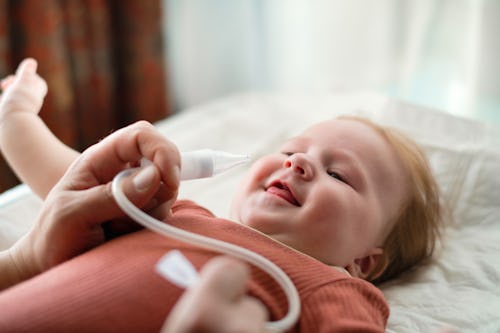
It’s 2023, and by now we all know not to Google random symptoms lest we diagnose ourselves with some terrifying, deadly illness. But what about the fun, simple little health hacks that pop up on our social media? There’s a new tip for parents circulating on TikTok, in which one mom says that an emergency room doctor recommended attaching a NoseFrida nasal aspirator to her breast pump to suck all the mucus from her baby’s nose. Here’s what pediatricians and the folks at Frida Baby have to say about it (which is, in short, “please don’t do this”), plus expert-approved methods for clearing out nasal congestion.
In her video, the mom says that when her son was 9 months old, he came down with respiratory syncytial virus (RSV) and croup. She took him to the ER for labored breathing, where they suctioned out his nose with a hospital-grade suction device. She says her doctor said she could replicate the process at home with a NoseFrida and her breast pump, and then demonstrates how to connect the two products.
It might seem like a harmless hack — you have to suck on the end of the NoseFrida nasal aspirator to suction out baby’s snot anyway, so what’s different about using a pump? Well, a lot of things, experts say.
It could injure your baby’s nose.
For starters, noses are delicate, with lots of little blood vessels close to the surface of the skin in our nostrils. Using these products with a level of suction they haven’t been tested with could cause an injury (like a nosebleed or swelling inside the nose).
“From a physician standpoint, nobody in our practice recommends this,” Dr. Randolph Thornton, M.D., a pediatrician with Jacksonville Pediatrics and Wolfson Children’s Hospital. (He polled his colleagues about whether any of them might share the NoseFrida-plus-breast pump hack with patients’ parents.) “What would be our concern is, can you develop too much suction and injure the nose? The little nasal membranes are pretty fragile. All the blood vessels are right on the septum, the wall that separates the two nostrils, and you can get in there and injure it and make it bleed. Can you injure the nose, make it swell? That’s what I worry about.”
You should ignore any online tip telling you to use a product differently than how the product’s packaging directs you to, says Dr. Samantha Minneman, M.D., FAAP, pediatrician at Children’s Hospital Colorado. The hospital-grade suction devices are designed to safely remove mucus with higher levels of suction power, while none of the NoseFrida parts (like the filters or tubing) have been tested with suction that strong.
In fact, a representative of Frida Baby tells Romper the manufacturer itself doesn’t recommend using the NoseFrida this way. “Frida Baby advises users to follow the instructions included with their NoseFrida and refrain from attaching it to an electric pump,” said a representative for Frida Baby in a statement to Romper. “The NoseFrida includes a booger-blocking filter that prevents any snot from reaching the parents’ mouth. The Electric NoseFrida is a great alternative for parents who prefer to suck at the push of a button without the manual effort.”
If this video appeals to you because you don’t want to have your mouth anywhere near your kid’s snot (totally fair), both doctors mention the electric NoseFrida as a safer alternative to chop-shopping your other baby products together.
It could infect or break your breast pump.
Aside from potential baby nosebleeds, sucking snot out using your breast pump could mean whatever viruses and bacteria are in that mucus will take up residence inside the pump next.
“There are open-system breast pumps where the milk actually flows through the pump. But milk isn’t thick and sticky, and so mucus and the germs that come with the mucus are going to be hard to get out of an open-system pump. You’re likely going to be breeding bacteria in the system that’s going to be hard to get all the way cleaned out,” says Minneman. “In a closed-system pump, they have a back flow valve that keeps milk and other liquids (like water from you washing it) from going into the mechanics of the pump. So, if you’re hooking up a suction device with no valve, you’re going to get mucus into the mechanics of your pump, which can break it.”
“There are multiple risks associated with using your breast pump in this way, and one of them is the possibility of exposing your baby to germs and bacteria that could lead to serious illness. I do not recommend that parents use the pump in this way,” adds Chrisie Rosenthal, an IBCLC with The Lactation Network, which connects families with insurance-covered lactation consultants.
How to relieve congestion for babies
Unlike the adult aisle of the pharmacy with decongestant medications galore, there aren’t any safe medicines for babies and toddlers to help with stuffy noses. With infants, you should spray saline in their nose and suction it out before feedings, Minneman says. A NoseFrida or similar nasal aspirator, or a bulb syringe, will do the trick, according to Thornton, and the salt in the saline spray will help break up thicker gunk. Other than that, just keep a close eye on their overall well-being, and if they don’t improve within a few days, call your pediatrician.
So, while this mom may have gotten this tip from her doctor, definitely check with your own pediatrician before trying any kid health hacks you see on social media.
Experts:
Dr. Samantha Minneman, M.D., FAAP, pediatrician at Children’s Hospital Colorado and associate professor of pediatrics at the University of Colorado School of Medicine
Dr. Randolph Thornton, M.D., a pediatrician with Jacksonville Pediatrics and Wolfson Children’s Hospital
Chrisie Rosenthal, an IBCLC with The Lactation Network, which connects families with insurance-covered lactation consultants
0 comments:
Post a Comment